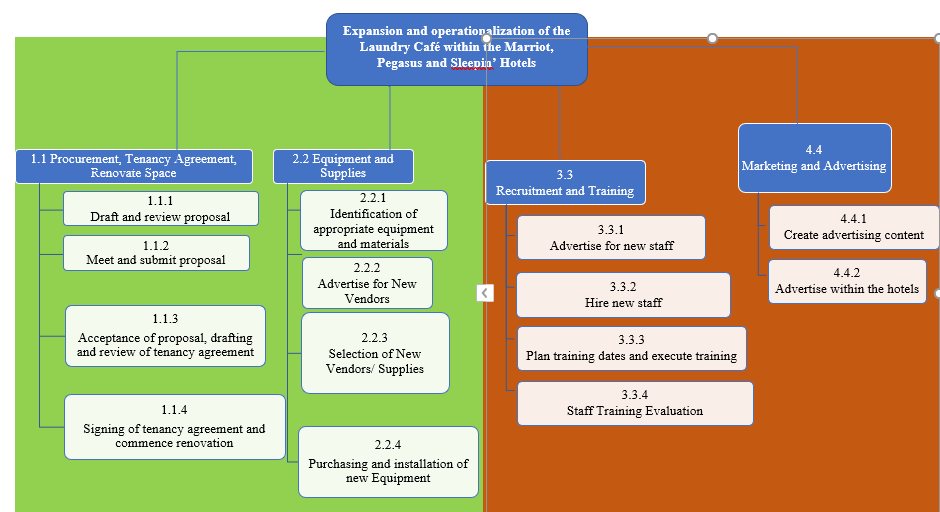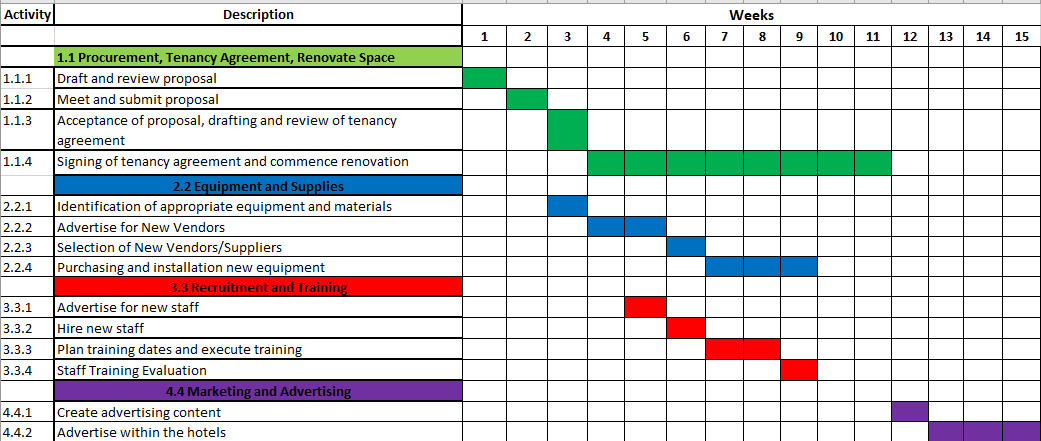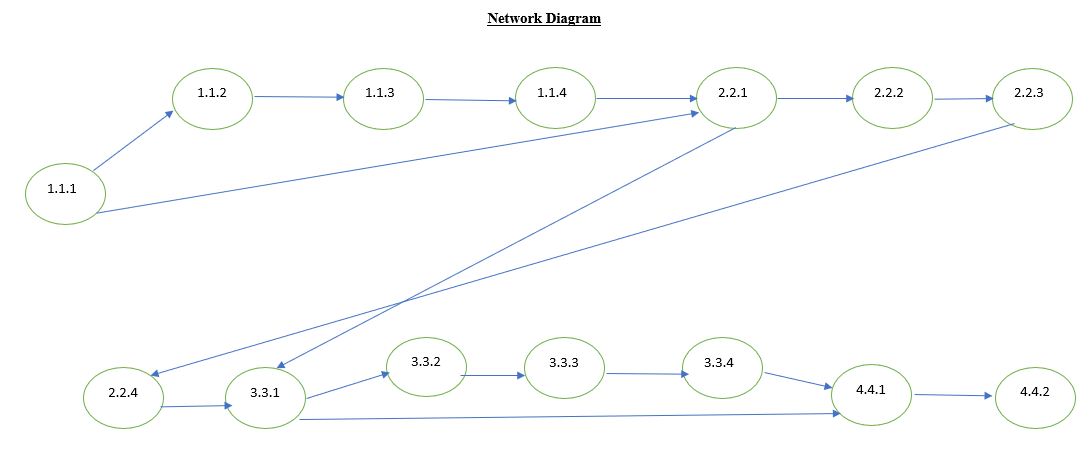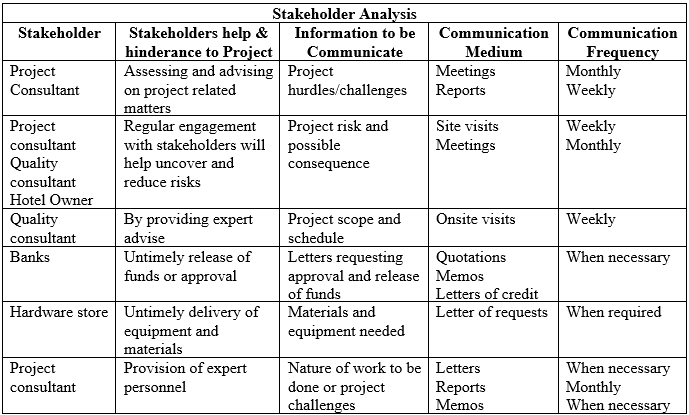Business Case
The laundry café has been a top-class and well-known laundry services provider in the region for the past three years. It has operated in the region since 2019 and is one of the four premier laundromats within Georgetown in Guyana. It is a full-service laundromat dedicated to consistently providing professional, reliable, convenient, and friendly services at competitive prices to all its customers. It is currently catering to the general walk-ins to provide all laundry-related services to all members of the general public. Due to the good services rendered to their customers, the company has acquired many customers. It has grown so big that its stakeholders saw the necessity to expand the business in some of the towns in the country. The business is under Mr. Deogracious, who supervises everything happening within the business, and they currently employ six full-time and two part-time employees. The used methodology throughout the project was PRINCE2 methodology. PRINCE2 methodology was deemed fit for laundry café project to assist in opening additional branches successfully within the stipulated duration. The reason behind expanding the business in some Hotels like Marriot, Pegasus, and The Sleepin’ Hotels is to make sure that the laundry cafe efficiently provides their services 24 hours to the occupants of these Hotels. In addition to the expansion plan, the laundry Café will renovate the occupied space where they are currently operating, train their staff, procure new commercial graded equipment within the established timeframe and budget (Mirhosseini, Pitera, Odeck and Welde, 2022). The project is required to take a maximum of fifteen weeks and a budget of 10,500 pounds.
Project Rationale
This is the argument made in favor of implementing the company’s proposed project. The rationale clearly explains why the project is needed in the region. Based on the benefits of the PRINCE2 methodology, the project will be beneficial in the following ways:
- The project will create employment opportunities for the Guyanese.
- It will generate more business capital. The business will receive more money from the extended branches in these hotels.
- It will improve the number and quality of services offered by the hotels
- Pandemic regulations require additional cleaning services, especially laundromat facilities.
Expected Benefits from the Project
- After the project shall have finished, it will increase laundromat services within the region of Guyana.
- It will enhance the efficiency and quality of the Laundry Café.
- It improves the growth of the company’s income.
- Create job opportunities for the Guyanese
- Build a better company reputation by servicing many people and gaining their trust in service delivery.
Project’s Estimated Cost
The project stakeholders set aside 10,500 pounds to undertake the project from the start to its completion. The total budget will be subdivided into the following section:
Procurement, tenancy agreement, renovate space is projected to take approximate 3,600-pound, equipment and supplies will take approximate 5,000 pounds, recruiting new employees and training the employees will take approximate 1,000 pounds, marketing and advertisement will take roughly 400 pounds, and contingency has been given a portion of 500 pounds (Weflen, MacKenzie and Rivero, 2022).
Project’s Duration
The project was set to take 15 weeks in total. Procurement, tenancy agreement, and renovation will take the longest duration since there are a lot of activities to be done here. This process will take a maximum of 11 weeks. purchase equipment and supplies to take 7 weeks, recruitment and training to take 5 weeks, and finally, the remaining four weeks will be taken by marketing and advertisement of the project’s product (Stanitsas, Kirytopoulos and Leopoulos, 2021). Alongside the project duration planning, the undertakings also had some options to expand and renovate the current place of operation, buy more equipment, and hire additional staff that will assist in realizing the business objectives and cater to the client’s needs in their respective sectors.
Risks Associated with the Project
The following are the risks that are associated with the project:
- Communication plan risk. This is the risk of misunderstanding the information within the communication plan.
- Resource. This may involve inappropriate resource use and poor quoting of the resources needed.
- Quality. The equipment used for the project development may not be up to standard. At times, the personnel used may also not be up to standard.
- Project scope. There might be a failure to understand project objectives and deliverables by the project team, thereby becoming a risk in the project.
- Schedule. Changes in the project scope may result in time overrun (Wu et al., 2021).
- Legal or regulations. Ligation may lead to the company losing its assets and reputation.
- Equipment. There might be late delivery of needed equipment for the project, or at the time, the equipment may malfunction.
- Environmental. This could be a risk associated with dangerous chemical leakage or weather issues that prevent timely construction.
- Economic. There may be a cost overrun
Scope Statement
Generally, it specifies the project’s deliverables and the effort necessary to produce those deliverables. The project scope statement gives a shared understanding of the project scope across all project stakeholders and specifies the project’s key objectives.
Project Objectives
There are five main objectives of the project, and they include:
- To open up other branches of laundry café in some big hotels in the country.
- To procure, establish tenancy agreements, and renovate hotel outlet space.
- Procure equipment and supplies.
- Recruit new staff and train them.
- Internal marketing and advertising.
Acceptance Criteria
- Acceptance criteria refer to an agreement between all stakeholders and managerial staff of project scope, budget, and timeframe.
- Identification and plans for mitigation of any potential risk.
- A quality management plan in the entire project timeline.
- Meeting with layers for the final draft of client, vendor, and employees’ contracts.
- Ensure all services are in keeping with the established hotel standards.
Project Deliverables
Deliverables are measurable items or services that must be supplied at various stages of a project and at the project’s conclusion. Deliverables keep projects on track and enable more effective time and money management. Through the application of the PRINCE2 methodology, the Laundry café will be able to get the below deliverables:
- Project overview
- Creating work Break down structure
- Create a quality management plan.
- Create an activity diagram create a budget breakdown.
- Create a communication plan.
- Create a risk register
- Create a network diagram with a critical analysis path.
The methodology of PRINCE2, despite of having several advantages, there also exist its drawbacks. PRINCE2 methodology is not readily applicable in all the projects.
Project Assumption
- A mutually beneficial tenancy agreement will be met.
- As a result of the Covid-19 pandemic, all equipment used in the project may be delivered late.
- There will be no interference with the Hotel management with the hotel‘s business activity.
- Internal advertisement will ensure hotel guests are aware of laundromat services.
- Remodeling of the three outlets will be compared within three months.
Project Constraints
The broad limits that you must account for during the project life cycle are project constraints. A financial limitation, for example, implies you’re limited to a set project budget, whereas a time constraint means you have to finish your project within a certain amount of time.
- The day-to-day hotel operations may hinder the construction of the project.
- Commercially graded equipment may be limited due to the ongoing Covid-19 pandemics.
- Inadequate staff to run the business for 24 hours.
- The project has a fixed duration and budget in essence that it cannot exceed 15 weeks and 10,500 pounds.
Time management
Work Breakdown Structure

List of activities
Table 1. Activities
Gantt chart

The network diagram and critical path

Risk Management Plan
A risk management plan is a written document that outlines the risk management process. This process begins with forming a team of stakeholders from throughout the company to assess the organization’s possible hazards (Stanitsas, Kirytopoulos and Leopoulos, 2021). The Risk management plan was developed through the help of PRINCE2 method. It provided all the needed frameworks in the development of the project plans.
Table 2. Risk management plan
Risk impact matrix
Table 3. Risk impact matrix
Stakeholder Analysis
In the development of this stakeholders’ plan, PRINCE2 methodology was used since it had to do with the project’s goals and boundaries, such as the methodology, deliverables, milestones, and budget. It aids Laundry café in the preparation of the Communication Plan, which establishes authority and limitations for stakeholders to communicate more effectively.
Table 4. Stakeholder analysis

Communication Plan
Table 5. Communication plan
Quality control
Table 6. Quality control
Lessons Learned from the Project
As we saw during the construction of the laundry cafe, leadership, interpersonal skills, besides motivational abilities are crucial in project management. Although PRINCE2 does not include leadership skills as part of its methodology, the Project Manager would still need it for the success of the project.
Assist Your Team: Assign projects to the right people and set reasonable deadlines. Encourage collaboration by creating an environment that is conducive to it.
Keep the lines of communication open by checking in with the team regularly. Make your expectations clear (Müller, Drouin and Sankaran, 2019).
Praise others: Frequently let your team know when they have done a good job.
Reference List
Stanitsas, M., Kirytopoulos, K. and Leopoulos, V., 2021. ‘Integrating sustainability indicators into project management: the case of construction industry,’ Journal of Cleaner Production, 279, p.123774.
Müller, R., Drouin, N. and Sankaran, S., 2019. ‘Modeling organizational project management,’ Project Management Journal, 50(4), pp.499-513.
Wu, C., Wu, P., Wang, J., Jiang, R., Chen, M. and Wang, X., 2021. ‘Ontological knowledge base for concrete bridge rehabilitation project management.’ Automation in construction, 121, p.103428.
Weflen, E., MacKenzie, C.A. and Rivero, I.V., 2022. ‘An influence diagram approach to automating lead time estimation in Agile Kanban project management,’ Expert Systems with Applications, 187, p.115866.
Mirhosseini, A.F., Pitera, K., Odeck, J. and Welde, M., 2022. ‘Sustainable project management: reducing the risk of cost inaccuracy using a PLS-SEM approach,’ Sustainability, 14(2), p.960.